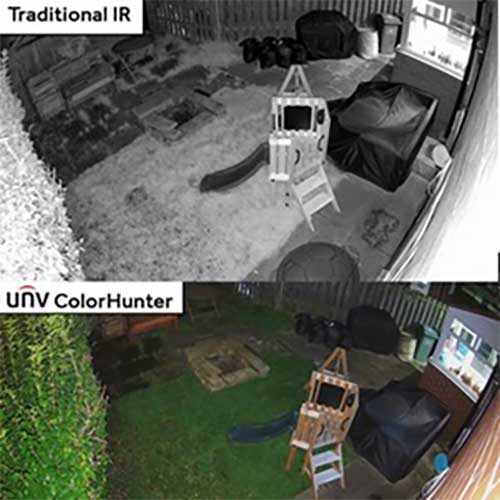Home CCTV systems are becoming increasingly popular within homes and are used as a common deterrent towards criminal activity. With the rise and growth of smart technology, CCTV systems are becoming more sophisticated than ever and have the capabilities to completely upgrade a home experience.
CCTV standards for closed-circuit television and is also known as video surveillance. It consists of a system of cameras that are connected and transmitted to a limited number of monitors. It allows video footage of multiple cameras to be viewed in one, secure place.
Previously, CCTV systems were reserved for offices, shops, businesses and organizations that had valuables to protect. Now, the increase in high-value items and smart-tech within the majority of households has driven these systems to be adapted for the home.
Home CCTV systems are therefore just that. A CCTV system designed for the home and most commonly controlled by the homeowners via a smart device App.
A home CCTV system works by each of the cameras taking continuous images which are then transmitted, either wirelessly or via a cable (depending on the system type), to the storage device and then a display monitor. The display monitor is where the user can see the sequence of images as video footage. In most cases with home CCTV systems, a smartphone or device is used as the monitor to view the footage.
There are two main types of systems that can be installed in the home. These are wireless and wired:
A wireless CCTV system is one that is set up with no internal wiring. In order for the cameras to communicate and transmit the images to a smart device, the home CCTV system uses an internet or WIFI connection.
In contrast, a wired CCTV system is one that uses cables and wires to transmit the video footage. Wired systems are usually slightly more complicated to install, due to requiring some internal wiring. Some very small building work may therefore need to take place during the installation.


There are multiple types of CCTV cameras out there, all with various features. The type of CCTV cameras you choose will be determined by your budget, camera locations and property type. Home CCTV cameras also vary in shape and style, as well as the way they are powered and their connectivity.
Where the security cameras are being placed around a property will influence the type of cameras chosen. For instance, there are indoor cameras to be used inside the home as well as outdoor cameras that will be weather-proofed and more durable.
The shape and style of home CCTV cameras are also important. Each shape is often designed for a certain use and will therefore work best in certain spaces. The following are the most common shapes of home CCTV cameras:
The features of home CCTV systems are endless, with manufacturers constantly creating new and innovative capabilities. However, there are some key features to look out for and are recommended to have for your home CCTV system.

If you’re presented with grainy footage and not able to see a potential intruder, then what’s the point? Making sure that the CCTV system records high-quality video footage is key. Some video cameras now offer 4K resolution, providing crisp footage that makes it easy to identify potential criminals.

HDR stands for High Dynamic Range. It’s a feature that guarantees the quality of camera footage, no matter the amount, or lack of, light available. It will manage glare and shadows so that a clear image can always be seen, so matter the weather or light conditions

Night version is also a great feature to have on a home CCTV system, for obvious reasons! Many burglaries take place in the early hours of the morning when it’s still dark. A night vision camera allows one to see activity that they couldn’t with bare eyes.

We’ve already mentioned zoom capabilities, but it is a key feature to have in a home CCTV system. Zoom in on a target or individual further afield for a closer look.

Some CCTV systems have inbuilt speakers and a microphone, allowing for audio to be played out. This is a great way to deter intruders or trespassers on a property and can often be done remotely to deter them away.

A system that notifies you when an alarm has been activated is essential. It will alert the homeowner that their property is at risk.
The number of benefits of having a CCTV system installed in your home is too many to count. From improving the overall security of your home, it can also help to bring criminals to justice!

The cost of home CCTV systems can vary. This is because their cost depends on multiple factors such as the quality of components, the number of cameras needed, the type of system chosen, as well as the size of the system needed in order to cover the service areas of the property. Additional high-tech features are also likely to cost a bit more
Other than the cost of the system, the installation cost is also something to consider and to factor in when budgeting for home CCTV. There are many advantages for getting your system professionally installed and is often an investment worth making. Many home security installers will quote you one price that includes the cost of the system as well as the installation cost.
Depending on the home CCTV system you choose, you may be able to install it yourself. There are a variety of DIY options available on the market, however, they do have their disadvantages and limitations compared to a professionally installed system.
It is recommended that you have a home CCTV installed by a professional if you want a system that is guaranteed to work long-term without any issues arising in the future. An NSI accredited professional installation company will make sure the installation is in line with all the necessary rules and regulations. They will also ensure that the system is working properly and safely. Also, if something were to stop working, you can rely on the installation company to fix the issue.
If you are interested in installing a CCTV system in your home, it is important to know and understand the laws and regulations surrounding CCTV, especially in terms of the privacy of others. If your home CCTV system only captures images from within the boundary of your property (this includes your garden), then the data protection laws do not apply to you.
The great thing about smart technology and the innovative new systems on the market is that the majority of them can be integrated and/or work alongside other home security systems, especially in properties set up to be smart homes.
Other systems home CCTV is integrated with include, burglar alarms, access control, video doorbells, smart intercoms and lighting.
If you have a monitored home CCTV system then a third-party monitoring company will handle the activation immediately, and action the most appropriate response to the situations, whether that be confirming a false alarm or calling the police.
However, if you don’t have a monitoring contract in place, you will be the one who received the notification of the CCTV cameras being triggered and you will be solely responsible for sorting out the issue and calling the police, if necessary.
Fill out your email to subscribe to our newsletter.
We are a family owned and operated electrical company with more than 50 years experience employed currently.